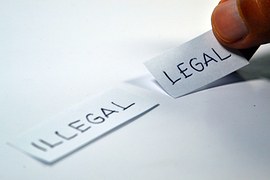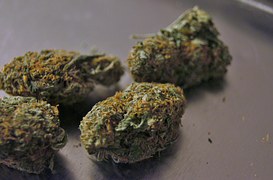Is Medical Marijuana Legal in Baltimore, MD?
Is legal to have Marijuana In Maryland? You actually get different answers to this question depending on who you ask. The possession of a small amount of marijuana has been decriminalized [i.e. it is treated as a civil offense] in Maryland.

That does not make it legal, it just means that the penalties are civil in nature and not criminal. The conduct itself is still disallowed. Maryland also provides immunity from prosecution and arrest if individuals with documented medical conditions possess and use marijuana they have obtained within the confines of, and pursuant to, a regulatory scheme. The availability of immunity does not make the underlying conduct legal, it just means that one cannot be prosecuted or arrested for that conduct. Maryland also provides an affirmative defense for those with serious medical conditions that possess and use marijuana under specific circumstances. Here again, the fact that one has a defense to a criminal charge does not make the underlying conduct legal. In fact, one would only have a defense to charges for conduct that was illegal. If it was legal conduct, you would not need a defense. Finally, marijuana is illegal under Federal law. The statements regarding the legalization of marijuana vary greatly, even among some of the best criminal defense attorneys. Ultimately, the specific label of “legal” medical marijuana may not matter all that much. In my view, the technically correct view here is that
…the possession of marijuana, under Maryland law, is not legal. Rather, it may be subject to only civil penalty for the possession of small amounts, and, if you possess it in relation to a serious health condition, you may have a defense, or be immune from prosecution and arrest.
If you are alleged to have possessed more than the statutory maximum, you are potentially subject to a possession change, and potentially, a possession with intent to distribute- or outright distribution- charge. In the fall of 2020, 4 more states, including neighboring NJ moved to legalize marijuana, generally, as step that Maryland has not yet taken. As Attorney Eric T. Kirk will tell you.
Health General §13–3313 provides immunity for the use and possession of medical marijuana. Specified individuals who act in accord with applicable law may not be subject to:
- arrest
- prosecution
- any civil or administrative penalty, including a civil penalty or disciplinary action by a professional licensing board, or
- denial of any right or privilege
Immunity from arrest or prosecution for medical use of or possession of medical cannabis is extended to a qualifying patient in possession of 30–day supply, or more, if the patient’s certifying provider stated more is needed. The law also extends immunity to others within the regulatory production and distribution network for medical cannabis, so long as they are acting within the requirements of the applicable medical marijuana framework. Other individuals who may claim this immunity include:

- A certifying provider
- A licensed grower or a registered grower agent
- A caregiver that meet statutory criteria
- A licensed dispensary or a registered dispensary agent
- A hospital, medical facility, or hospice program where a qualifying patient is being treated.
Source: Health General §13–3313 et seq.
Of primary interest here for the interested reader may well be what the law considers a “qualifying patient”. The law provides that a qualifying patient is an individual who has been provided with a written certification by a certifying provider in the context of a bona fide provider-patient relationship. The certification must be issued in the confines of a legitimate doctor-patient relationship, and contain a medical opinion that the individual has a condition that warrants the use of medical cannabis and that the use of medical marijuana outweighs any negative health benefits. The provider may also certify the individual needs more than a 30 day supply.
The legislature has intended that those suffering from the following conditions should be approved for the use of medical marijuana.

- a chronic or debilitating disease or medical condition that results in a patient being admitted into hospice or receiving palliative care
- a chronic or debilitating disease or medical condition or the treatment of a chronic or debilitating disease or medical condition that produces:
- cachexia, anorexia, or wasting syndrome
- severe or chronic pain
- severe nausea
- seizures
- severe or persistent muscle spasms.
- any other condition that is severe and for which other medical treatments have been ineffective if the symptoms reasonably can be expected to be relieved by the medical use of medical cannabis.
Source: Health General §13–3313 et seq.
Additionally, Criminal Law Article § 5-601 provides an affirmative defense for the use or possession of marijuana under certain circumstances:
- the defendant has a debilitating medical condition that has been diagnosed by a physician. [debilitating medical condition for purposes of this defense is defined, generally, the way that chronic or debilitating disease is defined in the medical marijuana provisions].
- the medical condition is severe and does not respond to traditional medicine
- marijuana is likely to provide relief
The defendant must notify the State of his or her intent to use the defense, and it is not available if the person used marijuana in a public place or had more than one ounce of marijuana.



